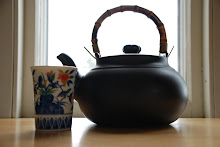
I had a wonderful pot of jasmine tea this morning. As I sat looking out the window at the boughs laden with snow, mentally observing my breathing, I felt suffused by calmness. The floral teacup in both of my hands was warm; the aroma and swirling steam wafted from the pale golden tea as I inhaled deeply. I felt all was well in the world before I embarked on my day.
The intersection of experiencing tea and the art of medicine interests me greatly. The meditative acts of preparing the tea and drinking it are akin to being very present and aware of my patient when I am with him in my examining room. I can give my whole attention to him, conscious of my rhythmic breathing and at the same time, heeding to his suffering.
The intersection of experiencing tea and the art of medicine interests me greatly. The meditative acts of preparing the tea and drinking it are akin to being very present and aware of my patient when I am with him in my examining room. I can give my whole attention to him, conscious of my rhythmic breathing and at the same time, heeding to his suffering.




4 comments:
Hi, does tea have any medicinal purposes? Has it been used to treat an particular illness?
Hi Nexus 6,
Tea (non-herbal) derived from the Camellia sinensis leaves has antioxidant properties that have been shown to reduce the risk of cancer in animal studies.
Other kinds of teas (which are not really teas but herbal infusions or tisanes) like ginseng tea have been used for ages to improve memory and general health.
I look forward to more musings about tea and medicine... as a naturopath (non-practising, mind you, but still very interested in all aspects of health and well-being despite my desk-bound government job) this is a topic close to my heart!
Veri-Tea,
Thanks for your comments.
Post a Comment